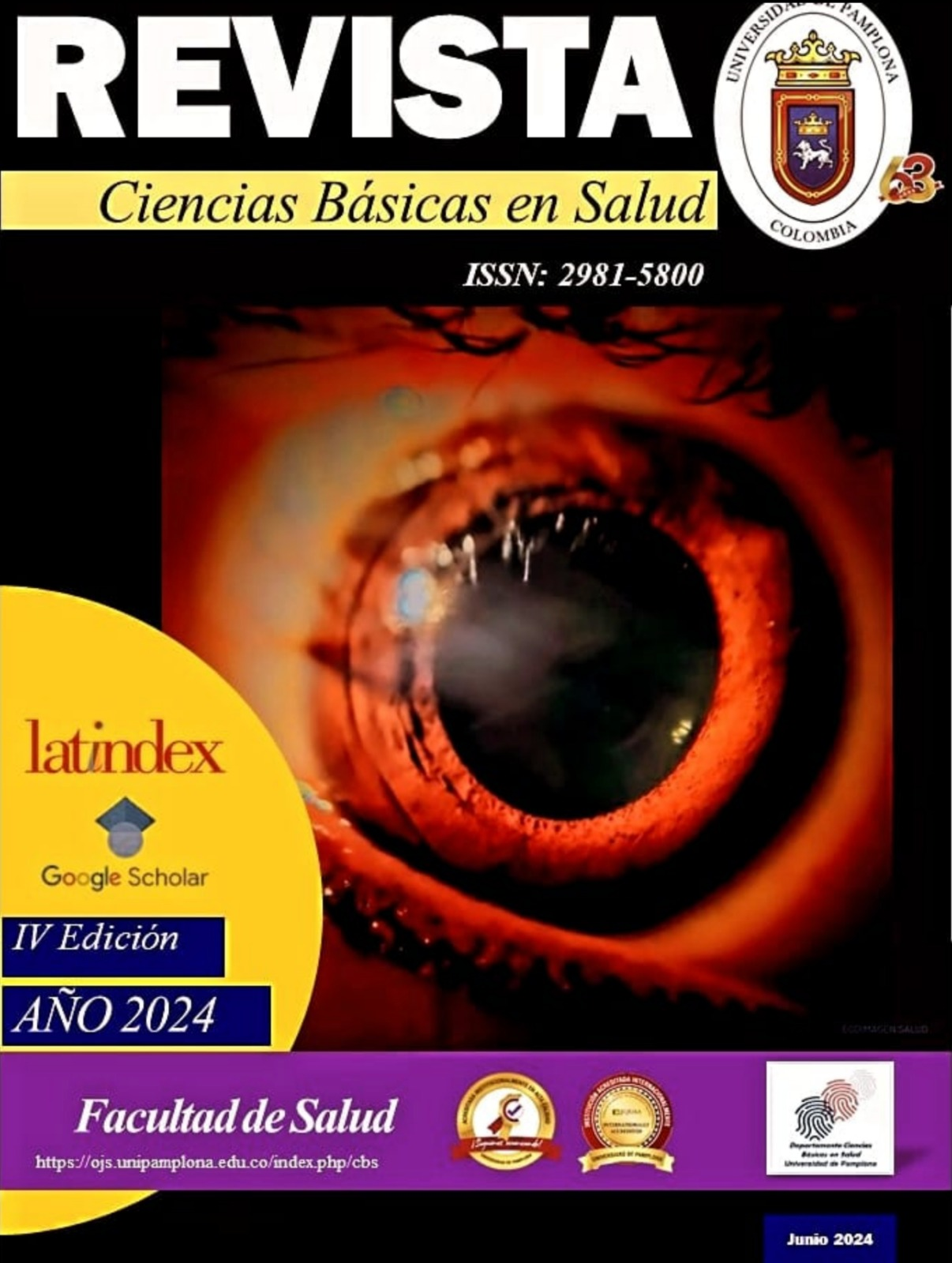Factores de riesgo cardiovascular en pacientes con cáncer de próstata de una unidad de cardio-oncología
DOI:
https://doi.org/10.24054/cbs.v2i2.2927Palabras clave:
hipertensión arterial, obesidad, tabaquismo, cáncer de próstataResumen
Antecedentes: La enfermedad cardiovascular es la principal causa de mortalidad en cáncer de próstata (CaP). El diagnóstico y manejo de factores de riesgo (FR) en estos pacientes representa una oportunidad para optimizar la supervivencia. Objetivo: evaluar la presencia de FR cardiovascular en CaP con y sin metástasis ósea de una Unidad de Cardio-Oncología. Método: estudio observacional, descriptivo de FR como peso, hipertensión arterial (HAS), diabetes, tabaquismo y dislipidemia. Resultados: se analizaron 420 pacientes con CaP, 74 metastásicos. La edad promedio fue 70 años. El sobrepeso (44,3%) fue el FR más frecuente, seguido de HAS (34,5%), dislipidemia (19.8%), tabaquismo (16%) y diabetes (9.5%). La HAS y la diabetes tuvieron mayor frecuencia en CaP y metástasis ósea en comparación con los no metastásicos. Hubo diferencia significativa entre tabaquismo y dislipidemia, los metastásicos fuman menos, pero tienen mayor hipercolesterolemia. La presencia de 3 o más FR predominó en metastásicos (31,1%) vs no metastásicos (15,9%) con diferencia significativa (p<0,001). Conclusión: Los sujetos con CaP al momento del diagnóstico tienen con mayor frecuencia sobrepeso e HAS. Los pacientes con CaP y metástasis ósea tienen tres o más FR en comparación con los no metastásicos. La población de riesgo debe continuar control cardiovascular en una unidad de Cardio-Oncología.
Descargas
Referencias
Globocan 2018 [Internet]. Lyon, France: International Agency for Research on Cancer. c2013- [cited 2018 Sep 23]. Available from: http://globocan.iarc.fr
Okwuosa TM, Morgans A, Rhee JW, Reding KW, Maliski S, Plana JC, et al. American Heart Association Cardio-Oncology Subcommittee of the Council on Clinical Cardiology and the Council on Genomic and Precision Medicine; Council on Arteriosclerosis, Thrombosis and Vascular Biology; and Council on Cardiovascular Radiology and Intervention. Impact of Hormonal Therapies for Treatment of Hormone-Dependent Cancers (Breast and Prostate) on the Cardiovascular System: Effects and Modifications: A Scientific Statement from the American Heart Association. Circ Genom Precis Med. 2021 Jun;14(3): e000082.
Zaorsky NG, Churilla TM, Egleston BL, Fisher SG, Ridge JA, Horwitz EM, et al. Causes of death among cancer patients. Ann Oncol. 2017; 1;28(2):400-407.
Liu D, Ma Z, Yang J, Zhao M, Ao H, Zheng X, et al. Prevalence and prognosis significance of cardiovascular disease in cancer patients: a population-based study. Aging (Albany NY). 2019; 27;11(18):7948-7960.
Swaby J, Aggarwal A, Batra A, Jain A, Seth L, Stabellini N, et al. Association of Androgen Deprivation Therapy with Metabolic Disease in Prostate Cancer Patients: An Updated Meta-Analysis, Clinical Genitourinary Cancer, 2023; 21 (3): e182-9.
Sun L, Parikh RB, Hubbard RA, et al. Assessment and Management of Cardiovascular Risk Factors Among US Veterans with Prostate Cancer. JAMA Netw Open. 2021;4(2): e210070.
Suárez-Carmona W, Sánchez-Oliver A. Indice de Masa Corporal: ventajas y desventajas de su uso en la obesidad. Relación con la fuerza y la actividad física. Nutr Clin Med 2018; 12 (3): 128-139.
Rubio-Guerra AF. Nuevas guías del American College of Cardiology/American Heart Association Hypertension para el tratamiento de la hipertensión. ¿Un salto en la dirección correcta? Med Int Mex. 2018;34(2):299-303.
Alfaro T. Situación Epidemiológica en Chile de las ENT y sus factores de riesgo. Unidad de Estudios y VENT, Departamento de Epidemiologia, DIPLAS Taller Regional de Vigilancia Epidemiológica de Enfermedades No Transmisibles. Ministerio de Salud, Gobierno de Chile. Valparaíso, 1 de septiembre 2011.
Caro Dougnac D. Impacto económico de las enfermedades crónicas. Santiago de Chile: Universidad de Chile; 2014.
Gómez-Portilla A, Martínez de Lecea C, Cendoya I, Olabarría I, Martín E, Magrach L. et al. Prevalencia y tratamiento de la patología oncológica en el anciano: El reto que se avecina. Rev. esp. enferm. dig. 2008; 100(11): 706-715.
Kim KB, Shin YA. Males with Obesity and Overweight. J Obes Metab Syndr. 2020; 29 (1): 18-25.
Sánchez C, Ibáñez C, Klaassen J. Obesidad y cáncer: la tormenta perfecta. Rev. Méd. Chile. 2014;142(2): 211-221.
Linden-Castro E, Pelayo-Nieto M, Alias-Melgar A, Perez-Grovas D, Ramírez-Pedraza J, Morales-Covarrubias J, et al. ¿Es la obesidad un factor predictor de agresividad en cáncer de próstata?, Rev Mex Urol. 2014; 74 (5): 275-280.
Organización Mundial de la Salud. Información general sobre la Hipertensión en el mundo. Ginebra. Setiembre 2013.
Stocks T, Hergens MP, Englund A, Ye W, Stattin P. Blood pressure, body size and prostate cancer risk in the Swedish Construction Workers cohort. Int J Cancer. 2010;127(7):1660-8.
Ruiz-Mori E. Riesgo y Prevención Cardiovascular. 1° Edic. Lima. Unigraph. 2014
Wallner LP, Wang R, Jacobsen SJ, Haque R. Androgen deprivation therapy for treatment of localized prostate cancer and risk of second primary malignancies. Cancer Epidemiol Biomarkers Prev. 2013;22(2):313-6.
Siltari A, Murtola TJ, Talala K, Taari K, Tammela TLJ, Auvinen A. Antihypertensive drug use and prostate cancer-specific mortality in Finnish men. PLoS ONE 2020;15(6): e0234269.
Jiménez-Mendoza E, Vázquez-Salas RA, Barrientos-Gutierrez T, Reynales-Shigematsu L, Labra-Salgado I, Manzanilla-García H, et al. Smoking and prostate cancer: a life course analysis. BMC Cancer. 2018; 18: 160.
Hager MH, Solomon KR, Freeman MR. The role of cholesterol in prostate cancer. Curr Opin Clin Nutr Metab Care. 2006;9(4):379-85.
Jamnagerwalla J, Howard LE, Allott EH, Vidal AC, Moreira DM, Castro-Santamaria R, et al. Serum cholesterol and risk of high-grade prostate cancer: results from the REDUCE study. Prostate Cancer Prostatic Dis. 2018 ;21(2):252-259.
Descargas
Publicado
Número
Sección
Licencia
Derechos de autor 2024 Revista Ciencias Básicas en Salud

Esta obra está bajo una licencia internacional Creative Commons Atribución-NoComercial 4.0.







